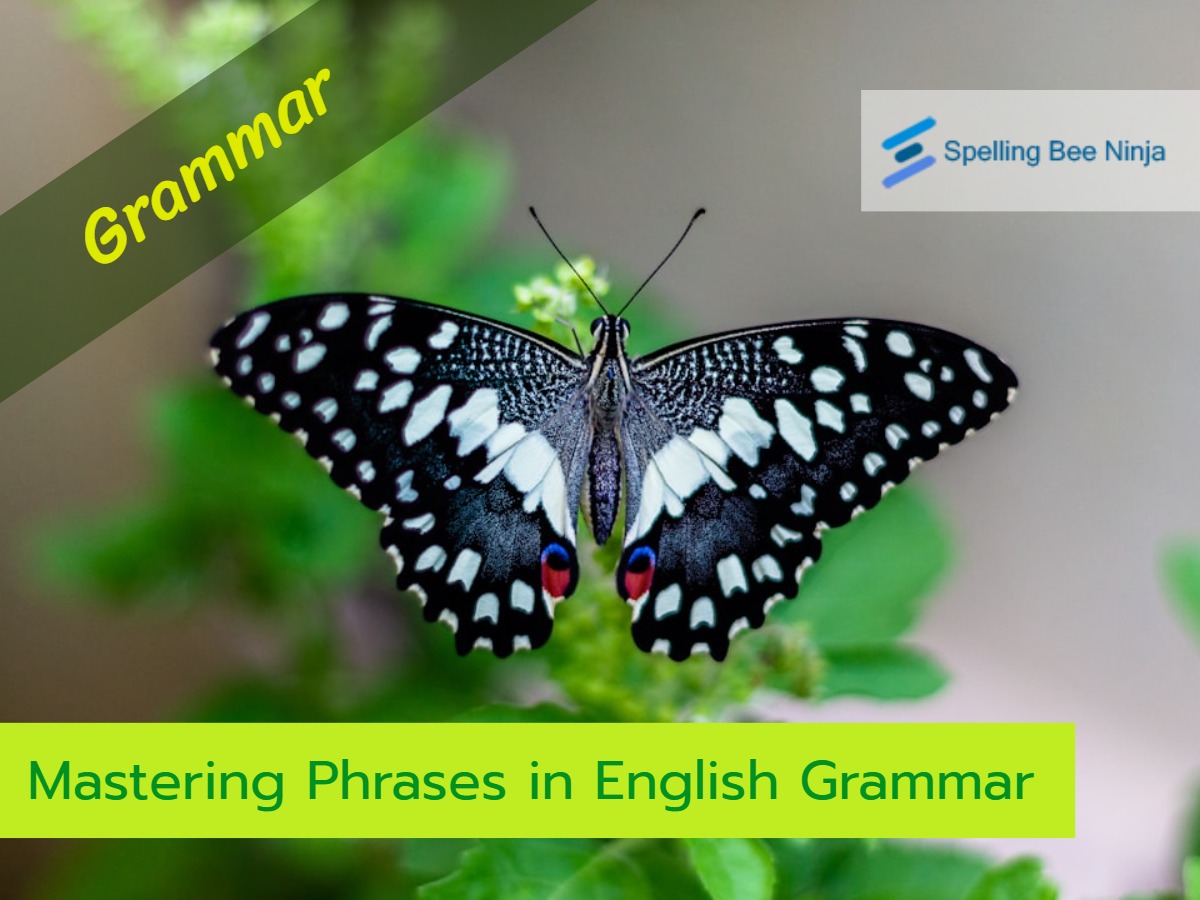In English grammar, a phrase is a group of words that work together to perform a single function in a sentence. Unlike a clause, a phrase does not contain a subject-verb combination. Phrases serve as essential building blocks in both spoken and written communication, helping to create vivid imagery, clarify meaning, and structure thought. There are several different types of phrases, each with its own grammatical function.
In this article, we’ll explore five major types of phrases:
- Noun phrases
- Verb phrases
- Prepositional phrases
- Gerund phrases
- Infinitive phrases
Let’s dive into each category with clear definitions and practical examples.
1. Noun Phrases
A noun phrase is a group of words that acts as a noun in a sentence. It includes a noun (the head word) and any modifiers that give more information about the noun.
Examples:
- The tall man entered the room.
(Noun phrase = The tall man; acts as the subject) - She bought a beautiful red dress.
(Noun phrase = a beautiful red dress; acts as the object) - They talked about the rise of artificial intelligence.
(Noun phrase = the rise of artificial intelligence)
Why It Matters:
Noun phrases allow us to add details and specificity. Rather than just saying “book,” you might say “the old dusty book from the attic.”
2. Verb Phrases
A verb phrase consists of the main verb and its auxiliary (helping) verbs. Together, they express actions, conditions, or states of being.
Examples:
- She has been working since morning.
(Verb phrase = has been working) - They will be traveling to Europe next month.
(Verb phrase = will be traveling) - He should have told the truth.
(Verb phrase = should have told)
💡 Verb Phrase Tip:
The main verb carries the meaning, while helping verbs adjust the tense, mood, or voice (e.g., passive vs active).
3. Prepositional Phrases
A prepositional phrase begins with a preposition and ends with a noun or pronoun, which is called the object of the preposition. These phrases act as adjectives or adverbs, providing more information about time, place, direction, or cause.
Examples:
- The keys are on the table.
(Prepositional phrase = on the table; tells us where) - She walked through the park.
(Prepositional phrase = through the park; tells us where) - We met after the meeting.
(Prepositional phrase = after the meeting; tells us when)
Why Prepositional Phrases Matter:
They add depth and clarity. Instead of saying “He ran,” we can say “He ran toward the stadium.”
4. Gerund Phrases
A gerund is a verb ending in -ing that functions as a noun. A gerund phrase includes the gerund and any modifiers or objects associated with it.
Examples:
- Swimming in the ocean is my favorite activity.
(Gerund phrase = Swimming in the ocean; acts as the subject) - He enjoys playing the guitar.
(Gerund phrase = playing the guitar; acts as the object) - They talked about going to the concert.
(Gerund phrase = going to the concert; object of the preposition “about”)
💡 Important Note:
Although gerunds are derived from verbs, they always function as nouns. If you can replace it with a regular noun and the sentence still makes sense, it’s likely a gerund phrase.
5. Infinitive Phrases
An infinitive is the base form of a verb preceded by “to” (e.g., to run, to read). An infinitive phrase includes the infinitive plus any modifiers or complements. These phrases can act as nouns, adjectives, or adverbs.
Examples:
- To win the prize was her dream.
(Infinitive phrase = To win the prize; acts as subject) - He has a plan to improve his English.
(Infinitive phrase = to improve his English; acts as adjective modifying “plan”) - She arrived early to catch the train.
(Infinitive phrase = to catch the train; acts as adverb explaining why she arrived early)
💡 Infinitive vs Prepositional:
Be careful not to confuse infinitives with prepositional phrases. “To the store” is a prepositional phrase (because “to” is followed by a noun), but “to eat lunch” is an infinitive phrase (because “to” is followed by a verb).
Comparing the Phrase Types
| Phrase Type | Acts As | Example | Key Feature |
|---|---|---|---|
| Noun Phrase | Noun | The excited student | Noun + modifiers |
| Verb Phrase | Verb | has been studying | Verb + auxiliaries |
| Prepositional Phrase | Adjective/Adverb | under the table | Preposition + object |
| Gerund Phrase | Noun | Reading books before bed | -ing verb used as a noun |
| Infinitive Phrase | Noun/Adj/Adv | to learn English quickly | “to” + base verb + modifiers |
Here’s the updated article with a student exercise section featuring a short sample essay. Students will identify different types of phrases, and a solution table follows.
Practice Exercise: Identify the Phrases
Read the paragraph below. Then, highlight or list all examples of the following phrase types:
- Noun phrases
- Verb phrases
- Prepositional phrases
- Gerund phrases
- Infinitive phrases
Sample Essay: “A Day in the Park”
On a sunny afternoon, the group of friends decided to explore the new park. Walking through the forest, they spotted a family having a picnic under a tree. The sound of birds chirping added to the peaceful atmosphere. They took turns pushing each other on the swing and laughing at silly jokes. Later, they sat on a wooden bench near the pond to enjoy the sunset. It was a perfect way to spend the day.
Solution Table
| Phrase Identified | Phrase Type | Explanation |
|---|---|---|
| the group of friends | Noun Phrase | Acts as the subject of the sentence |
| to explore the new park | Infinitive Phrase | Shows purpose; “to” + base verb + object |
| Walking through the forest | Gerund Phrase | Acts as subject (non-finite verb -ing) |
| a family having a picnic under a tree | Noun Phrase | Acts as the object; includes modifiers |
| under a tree | Prepositional Phrase | Tells location of the picnic |
| The sound of birds chirping | Noun Phrase | Subject of the sentence |
| of birds chirping | Prepositional Phrase | Modifies “sound” |
| pushing each other on the swing | Gerund Phrase | Object of “took turns” |
| laughing at silly jokes | Gerund Phrase | Also object of “took turns” |
| a wooden bench near the pond | Noun Phrase | Object of “sat on” |
| near the pond | Prepositional Phrase | Modifies “bench” |
| to enjoy the sunset | Infinitive Phrase | Purpose of “sat” |
| a perfect way to spend the day | Noun Phrase | Subject complement (renames “it”) |
| to spend the day | Infinitive Phrase | Modifies “way” |
Activity
Color-code each phrase type or rewrite the paragraph listing each phrase by category. This reinforces not only identification but grammatical function.
Verification Test
Do not forget to take our verification quiz t check your preparation using the link below:
Final Thoughts
Understanding phrases is essential to mastering English sentence structure. Each type of phrase contributes in a unique way:
- Noun phrases identify who or what is involved.
- Verb phrases express the action or state.
- Prepositional phrases add context and details.
- Gerund phrases turn actions into subjects or objects.
- Infinitive phrases express purpose, intent, or meaning.
Whether you’re writing essays, answering grammar questions, or improving your fluency, mastering these phrases will elevate your communication skills significantly.
- ✈️ How to Use Articles in English
- 🐝 Mastering Adjectives: A Key to Enhancing Your Writing Skills
- 🎮 Pronoun Puzzle: A Fun Way to Practice Personal and Possessive Forms
- 🎮 Adjective Adventure: Descriptive Word Search!
- ✈️ How to use prepositions in English
- ✈️ English Adverbs – 5 Quick and Easy ways to learn.
- The definitive pronouns list
- 🐝 Understanding conjunction words and where to use them
- ✈️ Modal Verbs in English: A Comprehensive Guide
- 🐝 Prepositions list – The definitive guide
- ✈️ Active and Passive Voice
- ✈️ What vs Which: differences and examples
- 🐝 Complete transition words list
- ✈️ How to Use Punctuation in English
- ✈️ Exploring the Difference Between “Will” and “Shall” in English
- ✈️ The Difference Between Could, Should, and Ought in English
- ✈️ Common Idiomatic Expressions in English
- ✈️ 40 English Prefixes and their meanings
- ✈️ 30 Most common English suffixes and their meaning.
- 🐝 Linking Words In English And How To Learn Them Effectively
- ✈️ Comparative and Superlative Adjectives
- ✈️ The Six Noun Types (Common, Proper, Countable, Uncountable, Collective, Abstract)
- ✈️ Understanding English Clauses: A Complete Guide
- ✈️ Understanding Sentence Structure in English
- ✈️ Gerunds and Infinitives: Understanding Verb Complements in English
- ✈️ Common Pronunciation Mistakes and How to Fix Them
- ✈️ Question Formation in English
- ✈️ Common Sentence Errors: Fragments, Run-ons, and Misplaced Modifiers
- ✈️ Say What?! A Fun Guide to Direct and Indirect Speech
- ✈️ Commonly Confused Words
- 🐝 ELA vocabulary: Essential English Language Arts Terms Every Student Should Know
- ✈️ Formal vs. Informal Language
- ✈️ Mastering Phrases in English Grammar
- ✈️ Conditionals (Zero, First, Second, Third, Mixed Conditionals)
- ✈️ Emphasis and Inversion in Sentences
- ✈️ Understanding and Using the Imperative Form


